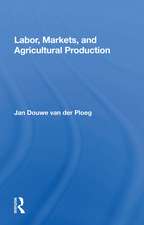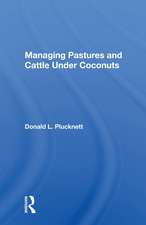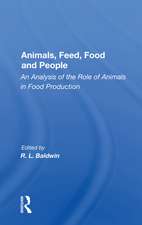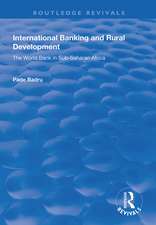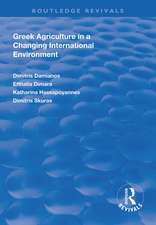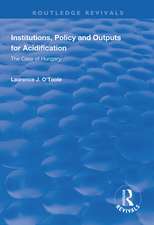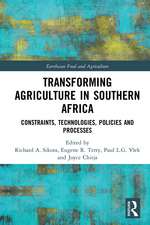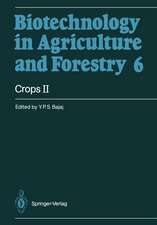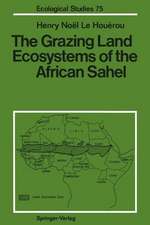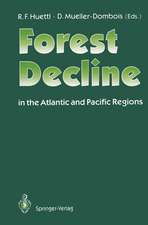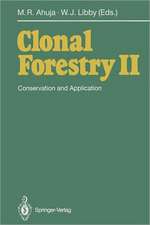Commercial Status of Plant Breeding in India
Autor Aparna Tiwarien Limba Engleză Paperback – 26 feb 2021
Plant breeding has the potential to improve quality of life for millions of people, and to harmoniously link agriculture, societies and ecosystems. Global efforts have been made to improve awareness and create a better and brighter future for plant breeding worldwide. Though substantial international research funding is available, and tremendous efforts have been made to achieve food security and sustainability in agriculture, their success can only be ensured when they are complemented by counterparts at the national level.
India is ideally poised to reap the benefits of plant breeding by integrating various parameters like adaptation, uncertainty, vulnerability and resilience into agriculture research strategies. Priorities include making agriculture more appealing to young talents, formulating farmer-friendly policies, combining advanced technologies with conventional plant breeding practices, and building the competencies needed to address emerging challenges in agriculture.
This book provides an essential overview of modern plant breeding, and demonstrates how education, entrepreneurship training and professional approaches can help transform the image of agriculture from a poor and unattractive domain into a lucrative and business-oriented one. In addition, it presents strategies to help achieve sustainable, accessible and affordable outcomes with breeding programs. The book’s primary goal is to encourage policymakers, academics, private institutions and non-profit organizations to combine their efforts in order to achieve a major transition in plant breeding activities in Asia. Accordingly, it highlights the importance of partnerships and collaborations for making breeding programs more comprehensive and meaningful.
| Toate formatele și edițiile | Preț | Express |
|---|---|---|
| Paperback (1) | 771.29 lei 38-44 zile | |
| Springer Nature Singapore – 26 feb 2021 | 771.29 lei 38-44 zile | |
| Hardback (1) | 942.63 lei 3-5 săpt. | |
| Springer Nature Singapore – 26 feb 2020 | 942.63 lei 3-5 săpt. |
Preț: 771.29 lei
Preț vechi: 1014.86 lei
-24% Nou
Puncte Express: 1157
Preț estimativ în valută:
147.60€ • 160.28$ • 123.99£
147.60€ • 160.28$ • 123.99£
Carte tipărită la comandă
Livrare economică 18-24 aprilie
Preluare comenzi: 021 569.72.76
Specificații
ISBN-13: 9789811519086
ISBN-10: 9811519080
Pagini: 127
Ilustrații: XIII, 127 p. 24 illus.
Dimensiuni: 155 x 235 mm
Ediția:1st ed. 2020
Editura: Springer Nature Singapore
Colecția Springer
Locul publicării:Singapore, Singapore
ISBN-10: 9811519080
Pagini: 127
Ilustrații: XIII, 127 p. 24 illus.
Dimensiuni: 155 x 235 mm
Ediția:1st ed. 2020
Editura: Springer Nature Singapore
Colecția Springer
Locul publicării:Singapore, Singapore
Cuprins
Chapter 1. Plant Breeding & Indian Agriculture.- Chapter 2. Plant Breeding & Seed Industry in India.- Chapter 3. Role of Education to Strengthen Plant breeding Capacity.- Chapter 4. Strategies to Strengthen Plant Breeding Status in India.
Notă biografică
Dr Aparna Tiwari, cofounder and Chief Executive Officer at ‘Foundation for Advanced Training in Plant breeding (ATPBR). She drives professional training, technology liasoning, awareness sessions and other capacity building activities. She also serves as a conference secretary and coordinates 5F Farming national conference annually.
Previously, she worked with Food and Agriculture Organization (FAO), Monsanto India Pvt Ltd., ICRISAT and MGM – Institute of technology at various role and responsibilities.
She has done her PhD and MSc from Wageningen University, The Netherlands and Bachelor (BSc) from Banaras Hindu University.
She has published several research papers in peer reviewed international journals and conferences.
Previously, she worked with Food and Agriculture Organization (FAO), Monsanto India Pvt Ltd., ICRISAT and MGM – Institute of technology at various role and responsibilities.
She has done her PhD and MSc from Wageningen University, The Netherlands and Bachelor (BSc) from Banaras Hindu University.
She has published several research papers in peer reviewed international journals and conferences.
Textul de pe ultima copertă
Plant breeding has the potential to improve quality of life for millions of people, and to harmoniously link agriculture, societies and ecosystems. Global efforts have been made to improve awareness and create a better and brighter future for plant breeding worldwide. Though substantial international research funding is available, and tremendous efforts have been made to achieve food security and sustainability in agriculture, their success can only be ensured when they are complemented by counterparts at the national level.
India is ideally poised to reap the benefits of plant breeding by integrating various parameters like adaptation, uncertainty, vulnerability and resilience into agriculture research strategies. Priorities include making agriculture more appealing to young talents, formulating farmer-friendly policies, combining advanced technologies with conventional plant breeding practices, and building the competencies needed to address emerging challenges in agriculture.
This book provides an essential overview of modern plant breeding, and demonstrates how education, entrepreneurship training and professional approaches can help transform the image of agriculture from a poor and unattractive domain into a lucrative and business-oriented one. In addition, it presents strategies to help achieve sustainable, accessible and affordable outcomes with breeding programs. The book’s primary goal is to encourage policymakers, academics, private institutions and non-profit organizations to combine their efforts in order to achieve a major transition in plant breeding activities in Asia. Accordingly, it highlights the importance of partnerships and collaborations for making breeding programs more comprehensive and meaningful.
Caracteristici
Evaluates the profitability and field application of heavily funded crop breeding programs Explores the market drivers of breeding programs Discusses the need for re-branding agriculture as an appealing entrepreneurial venture for youth



